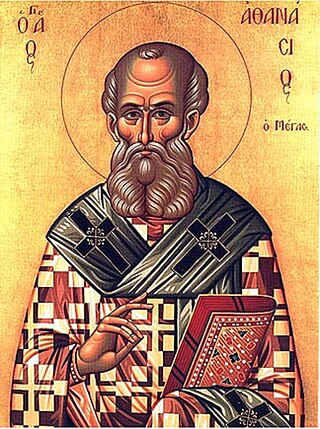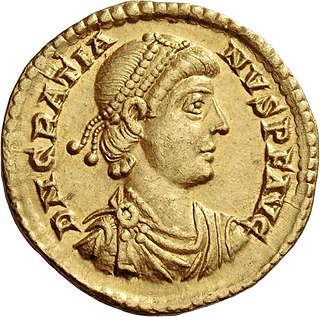Related Research Articles
Arianism is a Christological doctrine which rejects the traditional notion of the Trinity and considers Jesus to be a creation of God, and therefore distinct from God. It is named after its major proponent, Arius. It is considered heretical by most modern mainstream branches of Christianity. It is practiced by a minority of modern denominations, although some of these denominations practice related doctrines such as Socinianism, and some shy away from use of the term Arian due to the term's historically negative connotations. Modern mainstream denominations sometimes connected to the teaching include Jehovah's Witnesses, the Church of Jesus Christ of Latter-day Saints, some individual churches within the Churches of Christ, as well as some Hebrew Roots Christians and Messianic Jews.

Athanasius I of Alexandria, also called Athanasius the Great, Athanasius the Confessor, or, among Coptic Christians, Athanasius the Apostolic, was a Christian theologian and the 20th pope of Alexandria. His intermittent episcopacy spanned 45 years, of which over 17 encompassed five exiles, when he was replaced on the order of four different Roman emperors. Athanasius was a Church Father, the chief proponent of Trinitarianism against Arianism, and a noted Egyptian Christian leader of the fourth century.

Pope Julius I was the bishop of Rome from 6 February 337 to his death on 12 April 352. He is notable for asserting the authority of the pope over the Arian Eastern bishops, as well as setting December 25 as the official birthdate of Jesus.
The 380s decade ran from January 1, 380, to December 31, 389.
Year 377 (CCCLXXXI) was a common year starting on Friday of the Julian calendar. At the time, it was known as the Year of the Consulship of Syagrius and Eucherius. The denomination 381 for this year has been used since the early medieval period, when the Anno Domini calendar era became the prevalent method in Europe for naming years.
The 360s decade ran from January 1, 360, to December 31, 369.
The 340s decade ran from January 1, 340, to December 31, 349.
The 350s decade ran from January 1, 350, to December 31, 359.

Year 383 (CCCLXXXIII) was a common year starting on Sunday of the Julian calendar. At the time, it was known as the Year of the Consulship of Merobaudes and Saturninus. The denomination 383 for this year has been used since the early medieval period, when the Anno Domini calendar era became the prevalent method in Europe for naming years.

Hilary of Poitiers was Bishop of Poitiers and a Doctor of the Church. He was sometimes referred to as the "Hammer of the Arians" and the "Athanasius of the West". His name comes from the Latin word for happy or cheerful. In addition to his important work as bishop, Hilary was married and the father of Abra of Poitiers, a nun and saint who became known for her charity.
Eudoxius was the eighth bishop of Constantinople from January 27, 360 to 370, previously bishop of Germanicia and of Antioch. Eudoxius was one of the most influential Arians.

The Diocese of Sofia and Plovdiv is a Latin diocese of the Catholic Church which includes the whole southern part of Bulgaria. The remainder of Bulgaria falls within the Diocese of Nicopoli. The diocese is exempt, i.e. immediately subject of the Holy See, not part of any ecclesiastical province.
The Council of Philippopolis in 343, 344, or 347 was a result of Arian bishops from the Eastern Roman Empire leaving the Council of Sardica to form their own counter council. In Philippopolis, they anathemized the term homoousios, in effect excommunicating Pope Julius I as well as their rivals at the Council in Sardica, and introduced the term Anomoian and as a result, the Arian controversy was perpetuated, rather than resolved, as was the original intention of the Roman emperors Constans and Constantius.

Hosius of Corduba, also known as Hosius the Confessor, Osius or Ossius, was a bishop of Corduba and an important and prominent advocate for Homoousion Christianity in the Arian controversy that divided the early Christianity.
Acacius of Caesarea was a Christian bishop probably originating from Syria; Acacius was the pupil and biographer of Eusebius and his successor on the see of Caesarea Palestina. Acacius is remembered chiefly for his bitter opposition to Cyril of Jerusalem and for the part he was afterwards enabled to play in the more acute stages of the Arian controversy. The Acacian theological movement is named after him. In the twenty-first oration of St. Gregory Nazianzen, the author speaks of Acacius as being "the tongue of the Arians".
George was the bishop of Laodicea in Syria from 335 until his deposition in 347. He took part in the Trinitarian controversies of the fourth century. At first an ardent admirer of the teaching of Arius and associated with Eusebius of Nicomedia, he subsequently became a semi-Arian, but seems ultimately to have united with the Anomoeans, whose uncompromising opponent he had once been, and to have died professing their tenets.
The Council of Serdica, or Synod of Serdica, was a synod convened in 343 at Serdica in the civil diocese of Dacia, by Emperors Constans I, Augustus in the West, and Constantius II, Augustus in the East. It attempted to resolve "the tension between East and West in the Church." “The council was a disaster: the two sides, one from the west and the other from the east, never met as one.”
The Arian controversy was a series of Christian disputes about the nature of Christ that began with a dispute between Arius and Athanasius of Alexandria, two Christian theologians from Alexandria, Egypt. The most important of these controversies concerned the relationship between the substance of God the Father and the substance of His Son.

Christianity in late antiquity traces Christianity during the Christian Roman Empire — the period from the rise of Christianity under Emperor Constantine, until the fall of the Western Roman Empire. The end-date of this period varies because the transition to the sub-Roman period occurred gradually and at different times in different areas. One may generally date late ancient Christianity as lasting to the late 6th century and the re-conquests under Justinian of the Byzantine Empire, though a more traditional end-date is 476, the year in which Odoacer deposed Romulus Augustus, traditionally considered the last western emperor.
Stephen I of Antioch was the Bishop of Antioch between 341 and 345 or 342 and 344, depending on the source. He was leader of the Arian party, called Eusebians, during the Arian controversy and an adversary of Athanasius.
References
- ↑ al, Philip Schaff et. Nicene and Post-Nicene Fathers: Series II/Volume II/Socrates/Book II.